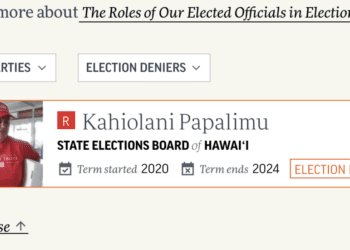Editor’s note: For Hawaii’s Nov. 5 General Election, Civil Beat asked candidates to answer some questions about where they stand on various issues and what their priorities will be if elected.
The following came from Jill Tokuda, Democratic candidate for U.S. House 2nd District, which covers rural Oahu and the neighbor islands. Her opponents are Republican Steve Bond and Libertarian Aaron Toman.
Go to Civil Beat’s Election Guide for general information, and check out other candidates on the General Election Ballot.
1. What is the biggest issue facing your district, and what would you do about it?
The biggest issue facing our district continues to be our kids and local families not seeing a future for themselves here in Hawaii, and leaving the place they call home because everything from housing to food is just too expensive.
From keiki to kupuna, our people need immediate relief. We need to meet people where they are at and build housing people can actually afford, from subsidized rentals to workforce housing to senior assisted living. We’ve got to do more to reduce the cost of living on everything from food, utilities, gas and prescription drugs.
We should immediately reinstate enhanced child tax credits, and expand the earned income tax credit. We need to make sure our kupuna can keep their food money even when their Social Security is adjusted, and I’ve been fighting to make sure federal food subsidy programs like SNAP reflect Hawaii’s true food costs, especially given the scarcity and increased costs for our rural and neighbor island communities.
In addition to driving down costs, we’ve got to create more opportunities for high quality jobs and career pathways in Hawaii. That means investments in education and training in innovative new digital industries, a greener economy and our care-economy.
2. What can the U.S. Congress do to reduce gun violence?
Gun violence is an epidemic plaguing our country that Congress has an urgent responsibility to eradicate. We owe it to our constituents to keep our keiki and communities safe. As the mom of two teenagers in our public schools and a member of the Gun Violence Prevention Task Force, gun reform legislation is a top priority.
I have cosponsored every major gun violence prevention bill introduced from banning assault weapons to supporting extreme-risk laws. I’ve signed discharge petitions to force a vote on these bills in Congress. And now that the Supreme Court has struck down the federal ban on bump stocks, it is Congress’ responsibility to step in and provide our communities this protection.
I am also proud to have introduced my own legislation to fight against the proliferation of ghost guns by giving law enforcement the resources to ensure that seized, surrendered and retired guns marked for destruction are actually eliminated and not reappearing on our streets to cause further violence.
I remain committed to ensuring Hawaii receives its fair share of all federal resources available to enhance crime reporting and support community-based violence intervention programs and victim services, including crisis response, medical and mental health care.
3. The polarization in Congress is worse than ever. Some say democracy itself is in trouble. How would you work to end the political polarization that divides both the Congress and the country?
While it’s true there are extremists in Congress working hard to create political divisions for headlines and personal gain, it’s also true that every day we have incredible moments of bipartisanship that don’t get as much media attention.
Since being in Congress I co-founded, and now co-chair, the Bipartisan Rural Health Caucus, which has more than 50 members from both sides of the aisle. We are able to put aside our political differences and come together to promote policy actions to increase access to quality, affordable health care and mental health services in rural areas across the country.
And, since the devastating fires in Lahaina last year, some of my strongest partners in Congress helping me to fight for resources and support for our people are members of the Republican Party.
I view each day as an opportunity for Congress to do better than the day before. It is in the best interest of all of our constituents that we work together rather than against each other. We don’t have to see eye to eye on politics and policy, but restoring democracy and civility comes down to remembering that we are there for the people.
4. Social Security, Medicare and Medicaid, while currently financially sound, risk future funding concerns because of changing demographics. What would you propose to shore up the country’s major safety net programs?
These programs and their solvency are essential to ensuring every American can retire with security and dignity, as well as supporting some of the most vulnerable in our communities.
Our nation’s health care spending is out of control — in the trillions each year. We need a more sustainable system that reduces administrative waste and roots out corporate greed, while expanding coverage and lowering costs for working families. I support Medicare for All because it would help us achieve these objectives to guarantee health care for everyone.
I do not support proposals that gut Medicare and Social Security for solvency. Instead, we can close loopholes in our tax policies that have allowed the ultra-rich to avoid paying their fair share of taxes.
One of the most promising reforms is the Social Security Expansion Act which would extend the solvency of Social Security for 75 years by requiring the wealthiest to pay their fair share into the program, lifting the payroll tax cap and subjecting all income above $250,000 to the Social Security payroll tax. This legislation would also provide a critical update to ensure cost-of-living adjustments more accurately reflect the everyday needs of kupuna.
5. Is the U.S. on the right path when it comes to mitigating climate change and growing renewable energy production? What specific things should Congress be considering?
The planet is in a climate crisis and aggressive action needs to be taken now. In island communities like ours we see the impacts every day whether it is our roads and homes falling into the ocean, torrential rains, flooding or extreme drought and the risk of wildfires.
The Bipartisan Infrastructure Deal was a landmark piece of legislation that is boosting clean energy jobs and strengthening resilience all over the country by investing in physical infrastructure like roads that won’t wash away.
This was followed by the Inflation Reduction Act (IRA), our single biggest investment in combating climate change. The IRA provides resources to mitigate carbon pollution, adapt to climate change and innovate energy technology. Congress and the federal agencies must ensure stakeholders are using these investments to their greatest potential.
Hawaii has been moving in the right direction with our commitment to be off of fossil fuels by 2045, but the federal government can still do more to incentivize the electrification of transportation, provide additional support for charging stations, batteries and biofuel research for aviation.
Partnering with the Department of Defense in renewable energy and climate resiliency are great opportunities for us in Hawaii.
6. What is your view on the U.S. role in foreign policy? What can the U.S. do to build better relations with the Asia-Pacific region?
The United States has an incredibly important role in world affairs as the global leader in the promotion of democracy and human rights, and our foreign policy should reflect those ideals.
To defend these values in the Indo-Pacific and deter aggression, we must strengthen our relationships with allies and partners. We must increase investments in the Department of State and U.S. Agency for International Development so they can grow their diplomatic efforts and expand our development work in the region.
We should also tap into the power of U.S. businesses, academic institutions and cultural exchanges to strengthen our regional ties. The U.S. market remains the most desirable in the world, and we need to advance integrated trade with the region. Additionally, academic and cultural exchanges can help deepen ties and promote greater understanding and appreciation of our democratic system.
Just as China is making economic and military investments in the region, the United States and our allies must step up and continue to do the same. While they continue to act with increasing aggression against Taiwan and in the South China Sea, we can avoid escalating conflict by being prepared for conflict.
7. Should the state renew the U.S. military’s leases on training grounds in Hawaii? Should there be new conditions on the leases and if so what?
Our location in the Indo-Pacific means we live with two truths. First, we are part of a larger Pacific ohana, connected politically, economically, culturally and historically. Second, given our location we will always have a central, strategic role to play. Given these truths, one of the biggest tasks we face is finding balance between our geopolitical role and the need to respect and protect the people, places and culture of Hawaii.
I support renewing the military leases for training grounds in Hawaii, but I also believe that everything must be on the table for discussion and negotiation, from overall footprint to community benefits. The reality is there has been a disproportionate impact relative to compensation and benefit, and that must change.
The federal government needs to fully compensate us for this land — not just fair value in terms of what the land is worth but also including the national security benefits from the use of this land. We need to look at compensation broadly, to include investments in community needs like housing, health care, education and workforce development. And, it must include responsible stewardship of our lands and the environment and efforts to protect and preserve our unique cultural heritage.

Sign up for our FREE morning newsletter and face each day more informed.
Sign Up
Sorry. That’s an invalid e-mail.
Thanks! We’ll send you a confirmation e-mail shortly.
Source link : http://www.bing.com/news/apiclick.aspx?ref=FexRss&aid=&tid=66dbba685db4470dbbeef75faa1995c3&url=https%3A%2F%2Fwww.civilbeat.org%2F2024%2F09%2Fcandidate-qa-us-house-2nd-district-jill-tokuda%2F&c=5301324093139712660&mkt=en-us
Author :
Publish date : 2024-09-06 13:38:00
Copyright for syndicated content belongs to the linked Source.






